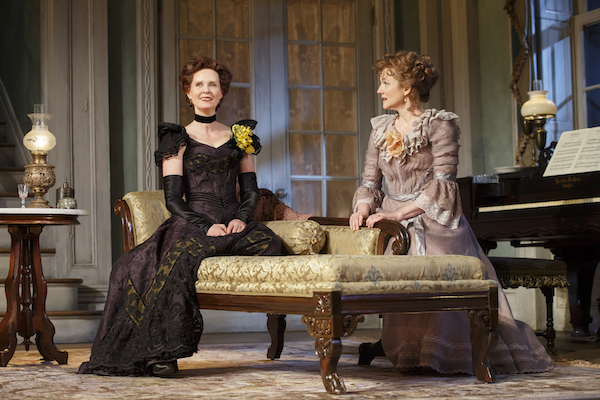
BY DAVID KENNERLEY | Lillian Hellman’s “The Little Foxes” has one of the juiciest female roles in American theater: Regina Giddens, a greedy matriarch conniving for control of the family cotton business in Alabama at the turn of the 20th century. None other than Tallulah Bankhead originated the Broadway role; in revivals, Anne Bancroft, Elizabeth Taylor, and Stockard Channing did their best to outshine that iconic standard.
And now, in the Manhattan Theatre Club’s splendid new production, it takes two actors to fill the role. Cynthia Nixon and Laura Linney play Regina at alternating performances (Nixon did the honors the night I attended), swapping out another key role, that of Birdie Hubbard, Regina’s flighty, foolish sister-in-law.
The two characters couldn’t be more different. If the kindhearted Birdie represents artistic culture, then the brusque Regina personifies hard-nosed capitalism. Tackling both roles in repertory is a testament to the versatility and courage of these gifted actors.
Nixon is extraordinary as the ruthless schemer, manipulating her brothers to snag a larger share of a lucrative, can’t-miss business deal — building a cotton mill so they no longer have to ship their crop to a facility up north.
Beneath Regina’s cold exterior lies an even stonier heart. Nixon masterfully amplifies the cynical, borderline bitchy demeanor that she perfected years ago as Miranda on “Sex and the City,” to chilling effect.
Greed is hardly Regina’s only motivation. Her money-grubbing brothers, Ben and Oscar, played to smarmy perfection by Michael McKean and Darren Goldstein, inherited their daddy’s fortune and, as a woman, she received zilch. She had little choice but to marry the now-ailing Horace Giddens (the ever-reliable Richard Thomas) not for love, but to secure her future. Now it’s payback time.
Linney’s somewhat mannered take on Birdie makes less of an impact, mostly because it’s a quieter role. The quadruple Emmy-winner is certainly convincing as the artistic dreamer who drinks too much and waxes nostalgic about the glory days of her family’s plantation, which was taken over by her husband, Oscar. Linney shines during a revelatory, heart-tugging monologue, between gulps of elderberry wine, where she admits that, on her wedding day, everyone knew Oscar married her for the cotton fields but she hadn’t a clue. And that she secretly dislikes her son, Leo (Michael Benz), who takes after his avaricious daddy.
Regina’s 17-year-old daughter, Alexandra (Francesca Carpanini), has a special bond with her Aunt Birdie and, at the play’s climax, has to make a tough choice between culture and capitalism.
Director Daniel Sullivan wisely takes a straightforward approach to this classic 1939 drama (no gimmicky projections or winking anachronisms here). Under his careful guidance, the three acts move at a fast clip. The handsome, realistic set of a vast, genteel parlor, anchored by a curving staircase, is designed by Scott Pask, and the eye-popping period costumes are by Jane Greenwood.
And yes, there is an old-timey red velvet curtain that announces the opening and closing of each act with an exclamation point.
In this gripping, psychologically rich revival of “The Little Foxes,” character and plot mesh seamlessly. Many of its themes still reverberate today: the tyranny of big business, the corrupt power of an unethical moneyed class, the disgrace of racial oppression, and the failure of doing nothing when crimes of injustice are committed.
No better is this articulated than in a pointed speech by Addie (Caroline Stefanie Clay), the devoted black servant.
“Yeah, they got mighty well off cheating negroes,” Addie says of the Hubbard family. “Well, there are people who eat the earth and eat all the people on it like in the Bible with the locusts. Then, there are people who stand around and watch them eat it. Sometimes I think it ain’t right to stand and watch them do it.”
THE LITTLE FOXES | Manhattan Theatre Club, Samuel J. Friedman Theatre, 261 W. 47th St. | Tue.-Wed. at 7 p.m.; Thu.-Sat. at 8 p.m.; Wed., Sat.-Sun. at 2 p.m. | $70-$150 at telecharge.com or 212-239-6200 | Two hrs., 30 mins., with two intermissions
































